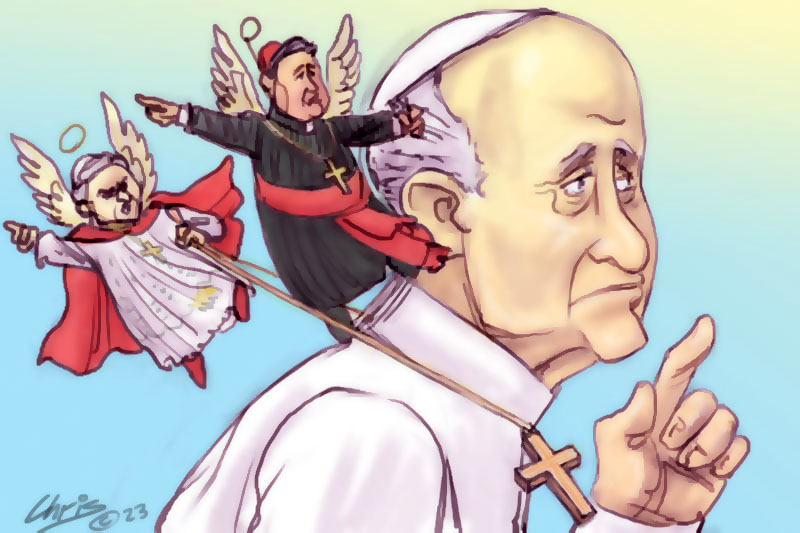The death of Pope Emeritus Benedict XVI on New Year’s Eve, though not unexpected, has permanently altered politics and personal relations at the top of the Catholic Church.

Popes Francis and Benedict were not ideological confreres, rather maintaining differences of opinion on topics ranging from aesthetics to theology to morality. And yet Francis always made a particular point of acknowledging his predecessor’s insights and contributions publicly. He called Benedict the ‘grandfather of all grandfathers’, a moniker of respect, for sure, though one might read into it as also a carefully worded attempt to emphasise that his own papal administration should be viewed as constituting generational change.
It seemed from that outside that, like many grandfathers, Benedict was often humoured but just as often ignored. His secretary and companion, Archbishop Georg Ganswein, confided to global media after Benedict’s death how Francis’ curbs on the Tridentine Latin Rite had ‘broken’ the German pope’s heart.
It’s likely public cordiality between the two pontiffs concealed a more complicated working relationship. Yet it suited both sides to downplay any possible frictions for the sake of the Church. Both men surely desired a successful precedent for what might happen should Francis one day choose to step down as well.
But now there is only Francis. Conservative Catholics have lost their greatest figurehead. The fact that only two weeks later they also lost, in George Cardinal Pell, one of their greatest champions will have made this a bitter double blow.
'Disagreement on teaching is also an inherent and inevitable part of Catholic History. It was present in the Church’s earliest years and has never been the product of a mere twin papal polarity. Both liberal Catholics and conservatives would do well to remember that they need to find common cause.'
The conventional wisdom will possibly be that Francis is now liberated. Unencumbered by the need to maintain the appearance of harmony with Benedict, he can advance a progressive agenda: women priests, more married priests, gays in Church, a full prohibition on ecclesiastical Latin, a pivot to the Global South, etc.
To recite this wish list of objectives which people have invested in Francis is one thing. But those who do so ought also to begin a process of reckoning with themselves the fact that they (mostly) will not happen. Francis was his own man before Benedict’s demise, and Benedict was far from the only factor restraining him from promoting radical reform across diverse areas then or now.
A cynic might even say Francis has perfected the art of hinting at change without actually delivering it. What makes anyone think this was not his intention and natural metier?
Take his recent remarks in a much-trailed interview with The Associated Press. The interview was wide-ranging, covering such awkward subjects as Francis’ own health and the future of his papacy, the disgraced Jesuit Marko Ivan Rupnik, and the scandal-afflicted bishop of East Timor Carlos Ximenes Belo.
But the ‘headline’ content of what Francis said concerned treatment of gays by the Church and in civil society. Francis was at pains to emphasise the wrongheadedness of criminalising homosexuality: gays are God’s children and others should not judge them was the overt tenor of his remarks.
As ever, Francis would seem to have calibrated his message carefully to tell everyone just what they wanted to hear from him. Liberals were given hope by his refusal to condemn; conservatives by his insistence that homosexuality is still a sin. Dig deeper and ambiguities in his positions are rife.
Liberals might note that the pope did not shift his teaching on this subject in any meaningful way. As I noted in another article, the distinction Francis invoked between ‘crime’ and ‘sin’ is an aged one which harks back to the Counter-Reformation which makes no reference to a very real third category of ‘wrong’ (such as when the Church discriminates against some groups of God’s children).
Yet conservatives perhaps ought to be just as alarmed at how casually Francis discarded the idea that there should be a a moral-philosophical basis for determining criminal law – at least when it comes to the realm of sexual ethics.
I labour the point because it seems to me the interview, and the approach, exemplify how Francis’ politics have triangulated across his papacy – and will no doubt continue to do so. He is not going to change now in what is self-evidently the ‘winter’ of his pontificate.
Francis may continue for one more year, or three, or (less conceivably) ten.
What he has not accomplished by now will most likely not happen. This is the iron logic of papal reigns. Like secular presidencies, they are most vital and energetic in their first days and the clock ticks down on them inexorably thereafter.
Francis’ legacy for the Church is most likely in place by now for the most part. And even should he wish to chart course for a radical departure he would probably find himself frustrated by opponents who know the value of playing for time only too well.
In the end, the Catholic Church is a highly complex organisation. For all the theory of the pope’s ability to shape the magisterium via pronouncements ex cathedra, it must move by consensus. We should not hang so much on the word of popes or their celebrity.
Disagreement on teaching is also an inherent and inevitable part of Catholic History. It was present in the Church’s earliest years and has never been the product of a mere twin papal polarity. Both liberal Catholics and conservatives would do well to remember that they need to find common cause.
The replacement of two popes by one will make no difference.
Dr Miles Pattenden is Senior Research Fellow in Medieval and Early Modern Studies at Australian Catholic University. His books include Electing the Pope in Early Modern Italy, 1450-1700 (Oxford University Press, 2017) and he is and Co-Editor of The Journal of Religious History (2022–).
Main image: Chris Johnston illustration.